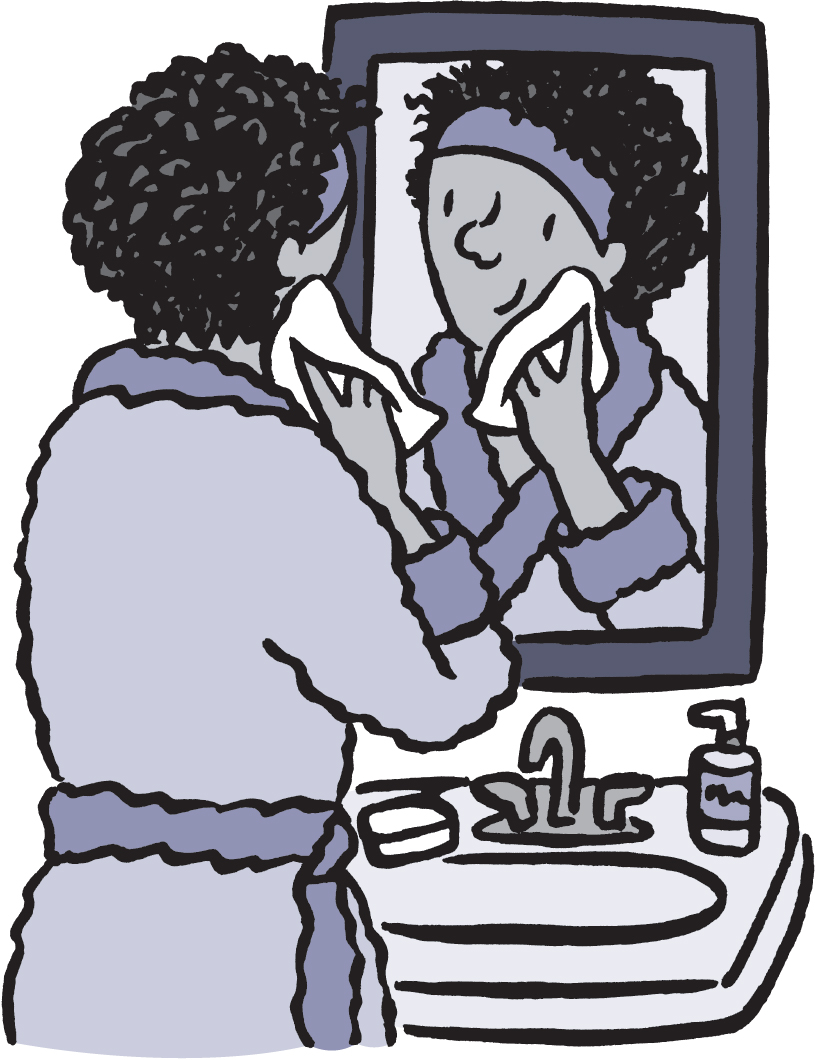Understanding Acne
How to Banish Breakouts

There are many myths about what causes acne. Some people blame foods for their outbreaks. Some think that dirty skin causes it. But there’s little evidence that either has much effect on most people’s acne.
People of all races and ages get acne. About 4 of every 5 people between the ages of 11 and 30 have outbreaks at some point. It’s most common in adolescents and young adults. Although acne is usually not a serious health threat, it can be upsetting, and severe acne can lead to permanent scarring. Fortunately, for most people, acne tends to go away by the time they reach their 30s.
Acne begins in the skin’s oil glands. The oils travel up a canal called a follicle, which also contains a hair. The oils empty onto the skin surface through the follicle’s opening, or pore.
The hair, oil and cells that line the narrow follicle can form a plug and block the pore, preventing oil from reaching the skin’s surface. This mix of oil and cells allows A type of microbe. bacteria that normally live on the skin to grow in plugged follicles. Your body’s defense system then moves to attack the bacteria and the area gets inflamed.
If the plugged follicle stays beneath the skin, you get a white bump called a whitehead. If it reaches the surface of the skin and opens up, you get a blackhead. It’s not because of dirt; the oil becomes black on the skin’s surface when it’s exposed to air. Both whiteheads and blackheads may stay in the skin for a long time. Eventually, the wall of the plugged follicle can break down, leading to pimples, or zits.
One important factor in acne is an increase in certain Molecules sent through the bloodstream to signal another part of the body to grow or react a certain way. hormones during puberty. These hormones cause the oil glands to enlarge and make more oil. Hormone changes related to pregnancy or starting or stopping birth control pills can also cause acne.
Studies suggest that you can inherit a tendency to develop acne from your parents, so genes likely play some role. Stress doesn’t cause acne, but research has found that for people who have acne, stress can make it worse.
Certain drugs are also known to cause acne. Greasy cosmetics, for example, can alter the cells of the follicles and make them stick together, producing a plug. If you have acne, try oil-free cosmetics. Choose products labeled noncomedogenic (meaning they don’t promote the formation of closed pores).
If you have acne, don’t rub or touch your pimples. Squeezing, pinching or picking at them can lead to scars or dark blotches. Gently wash your face with a mild cleanser twice a day—and after heavy exercise. Don’t use strong soaps or rough scrub pads; they may make the problem worse. It’s also important to shampoo your hair regularly. If you have oily hair, you may want to wash it every day.
Several over-the-counter medicines can treat mild acne. It may take up to 8 weeks before you notice an improvement. For more severe acne, talk to your doctor about the options.
Researchers continue to work on developing new drugs to treat acne. They’re also trying to better understand the causes of acne so they can explore new remedies. In the meantime, there are several available treatments that may help.
NIH Office of Communications and Public Liaison
Building 31, Room 5B52
Bethesda, MD 20892-2094
nihnewsinhealth@od.nih.gov
Tel: 301-451-8224
Editor:
Harrison Wein, Ph.D.
Managing Editor:
Tianna Hicklin, Ph.D.
Illustrator:
Alan Defibaugh
Attention Editors: Reprint our articles and illustrations in your own publication. Our material is not copyrighted. Please acknowledge NIH News in Health as the source and send us a copy.
For more consumer health news and information, visit health.nih.gov.
For wellness toolkits, visit www.nih.gov/wellnesstoolkits.




